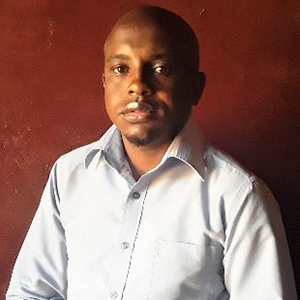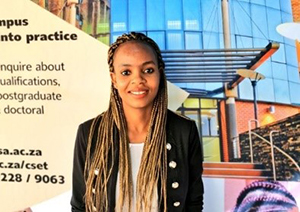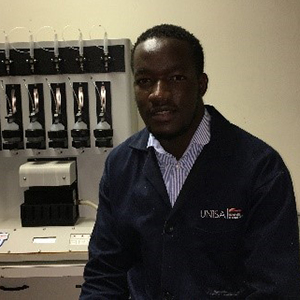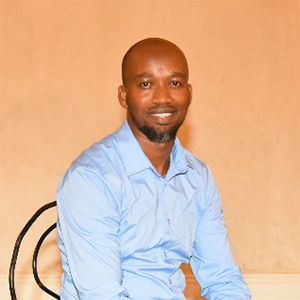News & Events
Providing clean water in innovative ways
Institute for Nanotechnology and Water Sustainability (iNanoWS) students Pfano Tshindane, Nomcebo Khumalo and Alfred Kajau joined the Unisa Innovation Student Challenge where they pitched a project on an energy efficient process for water treatment. It was chosen as one of the winners and will get funding for 2021.
The Unisa Innovation Challenge is a programme hosted by the Directorate of Innovation, Technology Transfer and Commercialisation, and promotes innovation amongst all Unisa students currently registered in 2020, irrespective of the qualification or duration or level of study. The presented idea/concept/product must be innovative and targeted at addressing a societal challenge. Students are also encouraged to bring forth new concepts or ideas that have never been implemented before to solve one of the many challenges our societies are grappling with.
How it all happened
The students submitted ideas that go through several steps where they are first screened and reviewed, followed by shortlisting. The shortlisted candidates then go into a four-day bootcamp where entrepreneurship and presentation skills are taught. These help to refine and improve the initial proposal idea. The improved version of the proposal is once again reviewed by the selection committee and successful candidates are shortlisted for the final pitch. These shortlisted candidates compete in the final pitch, and the selection committee decides on the winning projects.
The award is R100 000 per project and a maximum of ten projects can be funded. In addition, the awarded candidates get free mentorship and access to a commercialisation specialist, an IP specialist and a product design professional. Furthermore, there is an opportunity for assistance with prototype, pre-incubation services and marketing. International exposure is the cherry on top of the prize money.
The title of the project submitted by the iNanoWS team is “Energy efficient hybrid filtration-adsorbent membrane system for contaminated surface water treatment in rural areas”. The project is under the leadership of Dr Mxolisi Motsa. This means that the aim is to treat surface/river water and make it ready for safe consumption using a two-step treatment process involving an activated carbon sand filter and membrane filtration. The multigranular filter (sand and activated carbon) will target the removal of pollutants such as heavy metals, microbes and suspended matter. The second step aims to remove most organic pollutants (chemicals) and heavy metals making the water safe to drink. The materials that make up this hybrid system will be custom-made (prepared in-house) at the laboratories of the Institute for Nanotechnology and Water Sustainability (iNanoWS).
Providing clean water – Impacting communities
In an era where the whole world is battling with the Covid-19 pandemic, access to clean water has become an essential and preventative measure. One of the proven preventative measures to contracting Covid-19 is the frequent washing of hands with water. Therefore, everyone must always have access to clean water.
Expressing his sentiments about the project, Dr Motsa said: “This project aims to benefit low-income communities who have no access to clean water through the provision of clean drinking water, hence improving health by lowering the incidence of water-related diseases. In most cases, people in rural communities are forced to walk long distances to fetch better water, and these water sources are often unprotected from livestock and contamination. Thus, affordable innovative technologies are needed to improve the quality of locally sourced water and curb down the spread of water-borne diseases and, most importantly, improve sanitation habits, In addition, the provision of clean water can increase the time available for education and
self-development for community inhabitants.”

Alfred Tatenda Kajau, MSc Student, iNanoWS
Commenting on this exciting news, Alfred Kajau said: “This achievement means that a better world is possible for all, as this small step to solve the water crisis facing humanity has the possibility to come to fruition. Water is a basic human right and need; hence, our team will work to make sure that not only does each drop count, but that each drop is safe.”

Nomcebo Pearl Khumalo, PhD Student, iNanoWS
Expressing her excitement, Nomcebo Khumalo said: “The journey through this was truly an adventure; we went up against so many innovative ideas. For me, being amongst the winners meant our research will be brought to life – a full working prototype to provide clean water to a whole community. I am very excited that one of our research projects at iNanoWS has a shot at being commercialised, which syncs with the motives of the institute and I am very happy to be part of it.”

Pfano Tshindane, PhD Student, iNanoWS
Commenting on this achievement, Pfano Tshindane said: “This is just the first step in producing something handy for our communities. It is a great feeling to actually get the funds that will bring our idea to life. It is going to be an even greater feeling when we start building our unit. It is every student’s dream to build an item that improves the lives of people in rural communities – what better way to do that than building a unit that provides safe water to drink.”

Dr Mxolisi M Motsa, senior lecturer, iNanoWS
Affirming the student’s hard work, Dr Motsa said : “At the Institute for Nanotechnology and Water Sustainability, we place extreme emphasis in grooming innovators and future leaders in the field of nanotechnology and water treatment. We always encourage our students to take initiatives and expose themselves to academic challenges, as well as aspiring to impact society through their research. I am extremely excited and proud of the team’s achievement; we shall support them and their project in every possible way.”
* By Thembeka Ntuli-Mpapama, Communication and Marketing Specialist, College of Science, Engineering and Technology
Publish date: 2020/12/07
